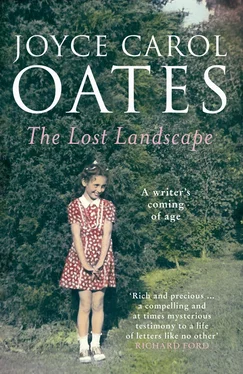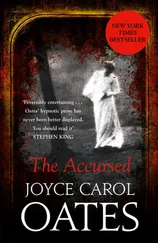If we began our Sunday drive along the Erie County side of the Tonawanda Creek to Pendleton a few miles away we might cross the wrought-iron bridge at Pendleton and enter Niagara County; if the drive was to be a relatively short drive we might turn right, or west, onto the Tonawanda Creek Road, return to Transit Road a few miles away and cross the bridge into Millersport, and so to our house which was the first on the right, beside a small Esso gas station (operated by my mother’s brothers Frank and Johnny Bush). Or, we might drive along the creek to Rapids, a few miles in the other direction, cross the bridge there and so return to Transit Road along a more circuitous route following the curves of the Tonawanda Creek, past the single-room schoolhouse which I attended for five grades, and which my mother had attended twenty years before, and so home. (“Tonawanda Creek Road” is a confusing term because, in effect, there were four roads with the same name, that might more accurately have been designated “Tonawanda Creek Road North-East”—“Tonawanda Creek Road North-West”—“Tonawanda Creek Road South-East”—“Tonawanda Creek Road South-West.” These were country roads narrow and minimally paved, bisected by the wider Transit Road running north and south.)
When my father drove, my mother sat beside him in the passenger’s seat. But whenever my mother drove, it meant that my father wasn’t coming with us because my father would never have consented to be a passenger in any vehicle in which he was not the driver.
(In this Fred Oates was the quintessential American male of his time. It wasn’t a question of “equality”—that my mother was a woman was not the issue; it was a question of who had authority in a vehicle, and this was likely to be the man of the family, in whose name the vehicle had been purchased.)
These least adventurous/most familiar Sunday drives nonetheless intrigued my brother Robin (Fred, Jr.; born on Christmas Day 1943) and me, for our mother knew the inhabitants of virtually all of the houses along the Tonawanda Creek, if not personally then by reputation, or rumor; my fascination with people, as with their houses and “settings,” surely began with these Sunday drives and my mother’s frequent, often quite startling and elliptical commentary. Six years in the one-room schoolhouse containing eight grades of often unruly “big boys” had enabled my mother’s generation of young people to know one another intimately, if not always fondly; sometimes my mother’s reticence was all that was forthcoming as we passed a house. (“Yes. I know who lives there.”)
This was an era memorialized by Edward Hopper of shingle-board houses with front porches and people sitting on these porches keen to observe people driving past in vehicles observing them. Narrow, winding creek roads were best for such sightings, for vehicles were likely to be driven at unhurried speeds on these roads; sometimes my mother would be stuck behind a slow-moving tractor or even a horse-drawn hay wagon.
Once, on the creek road to Rapids, when my father wasn’t with us, my mother behind the wheel suddenly said: “In that house, a terrible thing happened.”
Mommy slowed the car. No one appeared to be visible in the house, observing us.
(Had this been an ordinary-seeming dwelling? Not a farmhouse but a smaller, shanty-like structure with a tar paper roof, set back from the road on a badly rutted driveway. In the front yard, straggly trees. Rusted hulks of cars in the scrubby grass. Decades later the name of the family who lived there is still vivid in my memory—not Reichling but a name that slant-rhymes with it.)
A man had been murdered, my mother said. The father of a girl with whom she’d gone to school.
At first it was believed that the man had “disappeared”—his wife claimed not to know where he was. But then his body was discovered in the creek behind the house; it had been forced inside a barrel, and the barrel had been nailed shut, and rolled down to the creek where it only partially sank in about five feet of water close to shore.
“The wife and her man-friend murdered him. Stabbed him. It was a terrible thing.”
Why did they kill him, I wanted to know. Were they arrested, were they in prison, who had discovered the body in the barrel—many questions sprang to my lips which my mother was vague about answering, whether because Mommy thought I should not be so curious, or because she didn’t know. Enough for our mother to have surprised us by saying— It was a terrible thing.
(I HAVE TO CONCEDEthat I scarcely remember myself as a child. Only as an eye, an ear, a ceaselessly inquisitive center of consciousness. For instance, I can remember my mother’s tantalizingly brief account of the murder on the Tonawanda Creek Road in the direction of Rapids only a few miles from our house but I can’t fit this memory into a sequence of memories of that drive, that day, that week or even that year; our memories seem to lack the faculty for chronological continuity, in which case an episodic and impressionistic art most accurately replicates the meanderings of memory, and not chronological order. What is vivid in memory is the singular, striking, one-of-a-kind event or episode, encapsulated as if in amber, and rarely followed by the return home, that evening’s dinner, exchanged remarks, the next morning; not routine but what violates routine.
Which is why the effort of writing a memoir is so fraught with peril, and even its small successes ringed by melancholy. The fact is— We have forgotten most of our lives. All of our landscapes are soon lost in time .)
WHEN MY FATHER TOOKus on Sunday drives, it was more likely that he would take us much farther, as he drove faster; on Transit Road, which Daddy traveled all too frequently, he was inclined to drive above the speed limit, and to pass slower cars with some measure of irritation. My sense of maleness, based solely and surely unfairly upon my father Fred Oates, is that the male more than the female is inclined to impatience.
Where Mommy drove us on country roads never very far from the Tonawanda Creek, that cut through her childhood, as through mine, and fixed us comfortingly in place, Daddy had little interest in the familiar countryside of Erie County, apart from his visits to Lee’s Airfield. The landscape of Fred Oates’s boyhood was Niagara County: he’d been born in Lockport, in the least affluent area of the small city known informally as “Lowertown,” and had lived in Lockport all of his life until he’d married my mother and came to live with her in Millersport. (There had been an earlier domestic life in Lockport, about which I knew nothing, and which had always seemed to me romantic, as it had to have been short-lived. Only a scattering of snapshots allowed me to see my young parents, an infant bundled in their arms, photographed in a waste of snow behind a rented apartment in Lowertown near the canal. Where we lived before Millersport —was the terse description. Before we came to live with your grandparents. )
Daddy’s drives may have reflected his restlessness. The same restlessness that motivated him to fly airplanes, even to experiment one summer with a glider at Lee’s Airfield. (Gliders are far more dangerous than small aircraft and Daddy may have had some close calls with this glider, about which my brother and I would not have been told.) Though Daddy did not drive slowly past houses and name to us their inhabitants and hint to us of the mysteries of lives within, yet Daddy’s drives into Niagara County were more interesting than Mommy’s drives in Erie County, as they were farther-ranging, and fraught with the kind of urgency my father brought to most things.
Daddy liked to follow the Erie Barge Canal westward in the direction of the beautiful turbulent Niagara River or eastward into hilly Orleans County, in the direction of Brockport and Rochester; he liked to drop in on a small airfield in Newfane, where he had friends; he liked to drop in at the Big Tree Inn near Newfane, or the Inn at Olcott Beach on Lake Ontario; there was the excitement of the Niagara County Fair at the Fairgrounds, and the excitement of volunteer firemen’s picnics scattered through the county where food and drinks—especially beer—were served. Daddy’s drives were not without direction like Mommy’s but intended to bring him to places where, when he approached, voices lifted happily—“Fred! Jesus, here’s Fred Oates.”
Читать дальше












